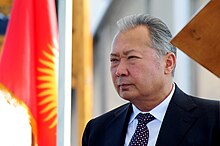Kurmanbek Bakiyev
| Kurmanbek Bakiyev Курманбек Бакиев |
|
|---|---|
 |
|
| 2nd President of Kyrgyzstan | |
|
In office 25 March 2005 – 15 April 2010 Acting until 14 August 2005 |
|
| Prime Minister |
Medetbek Kerimkulov Felix Kulov Azim Isabekov Almazbek Atambayev Iskenderbek Aidaraliyev Igor Chudinov Daniar Usenov |
| Preceded by | Ishenbai Kadyrbekov (Acting) |
| Succeeded by | Roza Otunbayeva |
| Prime Minister of Kyrgyzstan | |
|
In office 10 July 2005 – 15 August 2005 |
|
| President |
Askar Akayev Ishenbai Kadyrbekov (Acting) |
| Preceded by | Medetbek Kerimkulov (Acting) |
| Succeeded by | Felix Kulov |
|
In office 25 March 2005 – 20 June 2005 Acting until 28 March 2005 |
|
| President | Askar Akayev |
| Preceded by | Nikolai Tanayev |
| Succeeded by | Medetbek Kerimkulov (Acting) |
|
In office 21 December 2000 – 22 May 2002 |
|
| President | Askar Akayev |
| Preceded by | Amangeldy Muraliyev |
| Succeeded by | Nikolai Tanayev |
| Personal details | |
| Born |
1 August 1949 Masadan, Soviet Union (now Kyrgyzstan) |
| Political party | Ak Jol |
| Spouse(s) | Tatyana Bakiyeva |
| Alma mater | Kuybyshev Polytechnic Institute |
| Religion | Sunni Islam |
Kurmanbek Saliyevich Bakiyev (Kyrgyz: Курманбек Сали уулу Бакиев, Kurmanbek Sali Uulu Bakiyev; Russian: Курманбе́к Сали́евич Баки́ев; born 1 August 1949) is a politician who served as the second President of Kyrgyzstan, from 2005 to 2010. Large opposition protests in April 2010 led to the takeover of government offices, forcing Bakiyev to flee the country.
Bakiyev was the leader of the People's Movement of Kyrgyzstan before his ascendance to the presidency. He received most of his popular support from the south of the country.
The Legislative Assembly of Kyrgyzstan of the Supreme Council of Kyrgyzstan appointed him acting President on March 25, 2005, following the ousting, during the Tulip Revolution, of President Askar Akayev. In October 2007, Bakiyev initiated the creation of Ak Jol party, but could not lead it due to his presidency.
Following the events of the 2005 Tulip Revolution, Bakiyev won the 10 July ballot for the Presidential election with 89% of the vote with a 53% turnout.
Despite initial hopes, Bakiyev's term in office was marred by the murder of several prominent politicians, prison riots, economic ills and battles for control of lucrative businesses. In 2006, Bakiyev faced a political crisis as thousands of people participated in a series of protests in Bishkek. He was accused of not following through with his promises to limit presidential power, give more authority to parliament and the prime minister, and eradicate corruption and crime. Bakiyev claimed that the opposition was plotting a coup against him.
...
Wikipedia
